四六级真题语法解析
英语四六级考试语法全面解析

一、动词语态详解语态是动词的一种形式,它用来表示句中主语同谓语动词之间的关系。
英语有两种语态,主动语态和被动语态,主动语态表示主语是谓语动词动作的执行者,被动语态表示主语是谓语动词动作的承受者。
例如:1.I have repaired the radio.我修好了收音机。
2.The radio has been repaired.收音机被修好了。
3.The students cleaned the classroom.学生们打扫了教室。
4.The classroom was cleaned by the students.教室被学生们打扫了。
被动语态的构成:be + 过去分词1.A building was damaged by the storm.暴风雨毁坏了一座建筑物。
2.Our plate was made in China.我们的盘子是中国生产的。
3.My bike was stolen.我的自行车被盗了。
常用的被动语态的时态变化如下,以 ask 为例:现在I am asked, I am being asked, I have been asked过去I was asked,I was being asked,I had been asked将来I shall be asked, I shall have been asked过去将来I shall be asked被动语态的疑问句是把助动词提前到句首。
1.Has your TV set been repaired?你的电视机修了吗?2.Was the kite broken?风筝破了吗?3.Has the work been done?工作结束了吗?被动语态的否定式是在助动词后面加 not.1.The letter has not been sent out.信还没有发出去。
2.The little boy has not been found out.小孩还没有找到。
大学英语四六级语法真题长难句解析(课堂PPT)

四六级真题长难句分析
基本结构的长难句
1.断开:连接词断开,结束于下一个连接词前
Although it has been nearly 30 years since the first commercial mob1i7 le-phone network was launched, advertisers have yet to figure out how to get their messages out to mobile-phone users in a big way. (CET-4, 201312 选词填空)
四六级真题长难句分析
基本结构的长难句
1.断开 (1) 标点
(2) 连接词 7
(3) 分析主谓
四六级真题长难句分析
基本结构的长难句
1.断开
(1)标点
(2)连接词:从句开始于连接词,结束于?
8
(3)分析主谓 1)标点 2)下一 个连接词前 3ห้องสมุดไป่ตู้第一 个谓语动词前
四六级真题长难句分析
基本结构的长难句
大学英语四六级语法
真题应用:四六级真题长难句分析
1
四六级真题长难句分析
一、基本结构的长难句 二、特殊结构的长难句
2
四六级真题长难句分析
一、基本的长难句 1.断开 2.简化
3
二、特殊结构的长难句 1.分裂结构 2.嵌套结构 3.平行结构
四六级真题长难句分析
基本结构的长难句
4
四六级真题长难句分析
四六级真题长难句分析
基本结构的长难句
1.断开:连接词断开,结束于标点
But this is a real-life argument before a
四六级真题语法解析
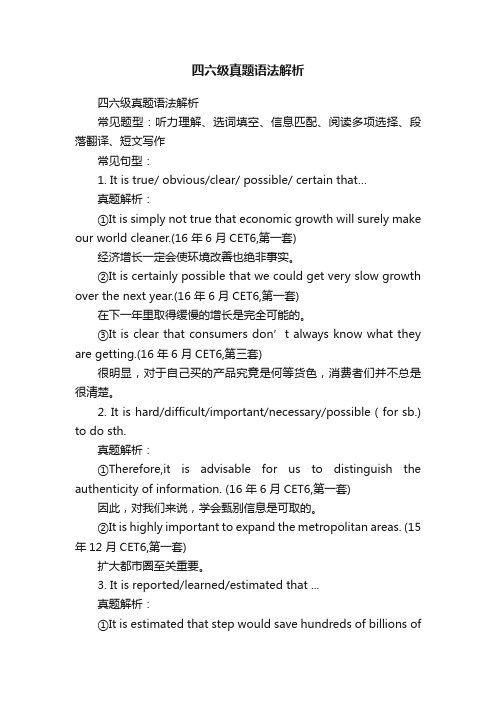
四六级真题语法解析四六级真题语法解析常见题型:听力理解、选词填空、信息匹配、阅读多项选择、段落翻译、短文写作常见句型:1. It is true/ obvious/clear/ possible/ certain that…真题解析:①It is simply not true that economic growth will surely make our world cleaner.(16 年6 月CET6,第一套)经济增长一定会使环境改善也绝非事实。
②It is certainly possible that we could get very slow growth over the next year.(16 年6 月CET6,第一套)在下一年里取得缓慢的增长是完全可能的。
③It is clear that consumers don’t always know what they are getting.(16 年6 月CET6,第三套)很明显,对于自己买的产品究竟是何等货色,消费者们并不总是很清楚。
2. It is hard/difficult/important/necessary/possible ( for sb.) to do sth.真题解析:①Therefore,it is advisable for us to distinguish the authenticity of information. (16 年6 月CET6,第一套)因此,对我们来说,学会甄别信息是可取的。
②It is highly important to expand the metropolitan areas. (15 年12 月CET6,第一套)扩大都市圈至关重要。
3. It is reported/learned/estimated that ...真题解析:①It is estimated that step would save hundreds of billions ofdollars over the next decade. (16 年6 月CET6,第二套) 据估计,这一举措将在未来十年节省数千亿美元。
英语四六级语法常用现象及翻译真题解析 CET4&CET6
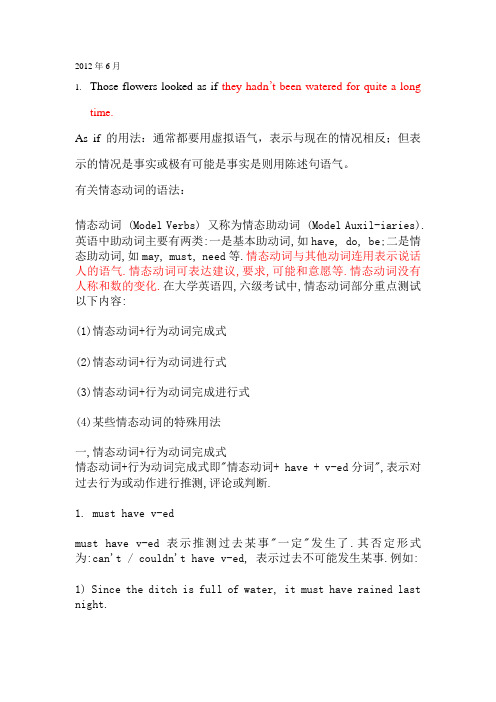
2012年6月1.Those flowers looked as if they hadn’t been watered for quite a longtime.As if 的用法:通常都要用虚拟语气,表示与现在的情况相反;但表示的情况是事实或极有可能是事实是则用陈述句语气。
有关情态动词的语法:情态动词 (Model Verbs) 又称为情态助动词 (Model Auxil-iaries).英语中助动词主要有两类:一是基本助动词,如have, do, be;二是情态助动词,如may, must, need等.情态动词与其他动词连用表示说话人的语气.情态动词可表达建议,要求,可能和意愿等.情态动词没有人称和数的变化.在大学英语四,六级考试中,情态动词部分重点测试以下内容:(1)情态动词+行为动词完成式(2)情态动词+行为动词进行式(3)情态动词+行为动词完成进行式(4)某些情态动词的特殊用法一,情态动词+行为动词完成式情态动词+行为动词完成式即"情态动词+ have + v-ed分词",表示对过去行为或动作进行推测,评论或判断.1. must have v-edmust have v-ed 表示推测过去某事"一定"发生了.其否定形式为:can't / couldn't have v-ed, 表示过去不可能发生某事.例如:1) Since the ditch is full of water, it must have rained last night.2) You couldn't have met my grandmother. She died before you were born.2. could have v-edcould have v-ed 表示推测过去某动作"很可能"发生了.例如:1)"The dictionary has disappeared. Who could have taken it?"2)"Tom could have taken it. He was alone yesterday."3.may / might have v-edmay / might have v-ed 表示推测过去某事"也许"发生了.may 比might 表示的可能性在说话人看来稍大些.例如:I can't find my keys. I may / might have left them at the school yesterday.4. ought to / should have v-ed 和 ought not to / shouldn't have v-edought to / should have v-ed 和 ought not to / shouldn't have v-ed 用于对已发生的情况表示"责备","不满",分别表示"本应该…"和"本不应该…".例如:1) With all the work finished, I should have gone to the party last night.2) You ought not to have made fun of him. He is not the one you laugh at but learn from.5. needn't have v-edneedn't have v-ed 表示过去做了某事,但没有做的必要, 意为"本没必要…".例如:You needn't have waken me up; I don't have to go to work today.注:表示推测过去某动作发生的可能性时,就表示的可能性程度而言,must最大,could其次,may更次之,might最小.例如:"I wonder how Tom knew about your past.""He must / could / may / might have heard of it from Mary." 二,情态动词+行为动词进行式情态动词+行为动词进行式(即情态动词+ be + v-ing形式),表示推测或评论某动作现在是否正在进行.例如:1) He must be playing basketball in the room.2) She may be staying at home.三,情态动词+行为动词完成进行式情态动词+行为动词完成进行式(即情态动词+ have been + v-ing 形式),表示推测或评论过去某动作是否正在进行或一直在进行.例如:1) They should have been meeting to discuss the problem.2) He may / might have been buying stamps in the post office when you saw him.四,某些情态动词的特殊用法1. need考试中主要测试 need 作情态动词与作实义动词的区别,对此,可参见表1.need 作情态动词时,后面跟不带to 的动词不定式,即 "need do".通常用在疑问句和否定句中,表示询问是否有"必要",其否定形式为needn't,表示"不必";疑问形式为Need … do 极少用于肯定句.例如:1) I don't think we need turn the light on at that time.2) Need you ride a bike to the school?真题:2011年6月Jane is tired of dealing with customer complaints and wishes that she______________________.(能被分配做另一项工作)2012年6月It is suggested that the air conditioner ______________.(要安装在窗户旁)should的型虚拟语气,表示主观愿望的词。
大学英语四六级语法测评卷(含答案解析)

大学英语四六级语法测试卷1.---What’s your idea?---My opinion is , happens, we should not stop the reform.A.when; whatB. that; whenC. that; whateverD. when; what2.Martin Smith who, at 22, is one of the male nannies(保姆) admits that it will be some timemale nannies are totally accepted.A.sinceB. untilC. beforeD. after3.Provide your doctor with a detailed medical history he can give you theaccurate treatment.A.even ifB. so thatC. in caseD. as though4.The little girl who got lost decided to stay she was and wait for her mother.A.whatB. howC. whereD. who5.She always comes to our help when we get into trouble she is very busy.A.ever sinceB. onceC. even ifD. so that6.The young couple, who returned my lost wallet, left I could ask their names.A.whileB. beforeC. afterD. since7.I went the South Lake in Hanzhong, I was deeply impressed with its beautiful scenery.A.For the first timeB. The first timeC. At firstD. It was the first time8.Cathy had quit her job when her son was born she could stay home and raise her family.A.now thatB. as ifC. only ifD. so that9.you start eating in a healthier way, weight control will become much easier.A.UnlessB. AlthoughC. BeforeD.Once10.I’ll be out for some time. anything important happens, call me up immediately.A.In caseB. As ifC. Even thoughD. Now that11.I don’t really like the author, I have to admit his books are very exciting.A.althoughB. unlessC.untilD. once12.No one can ignore the fact that his wife is independent her husband earns all or mostof the family income.A.now thatB. in caseC. even ifD. only if13.It is hard for the Greek government to get over the present difficulties gets morefinancial support from the European Union.A.ifB. unlessC. becauseD. since14.They reached the top of the mountain they could see the highway wandering before them.A.whichB. whyC. whoseD. where15.I tried all I could do the topic at the meeting, but failed.A.avoid mentioningB. to avoid mentioningC. avoiding to mentionD. avoiding mentioning16.If you’d like to gain more contents from the website, you have to answer some messagespersonal information.A.r ecognizingB. requestingC. preferringD. expressing17.The building last spring is a hospital for children and women.A.to builtB. to be builtC. builtD. building18.The students went into the classroom, .A.talking and laughingB. talk and laughC. talked and laughedD. to talk and laugh19.When about the possibility that Justin was taken away by aliens, Detective SanPeterson,who has taken charge of the case, didn’t say much.A.askingB. askedC. to askD. ask20.I regret you that my daughter has already regretted out with you. So leaveher alone and don’t bother her any more.A.telling; datingB. to tell; to dateC. to tell; datingD. telling; to date21.The people of the flooded area are reported into newly built buildings, where theyare living better than ever before.A.movingB. to have movedC. to moveD. having moved22.The old woman sat in her favorite chair and with her eyes on the window.A.fixedB. fixingC. to be fixedD. to be fixing23.When I rushed there, there were so many people outside the booking office that Icould figure out that my chances of getting a ticket were slim.A.waitingB. waitedC. to waitD. who wait24.The young man, in heavy traffic on the way, got home an hour later than usual.A.catchingB. caughtC. having caughtD. to be caught25.---Don’t you call Mr. Wang at nine tomorrow?---He to a lecture on the reform of the college entrance examination.A.will listenB. will be listeningC. is listeningD. will have listened26.The singer’s music video nearly 9 million times since it was posted on the Internetfour weeks ago.A.viewedB. was viewedC. has viewedD. has been viewed27.warmly for his work, he was too to fall asleep.A.Praising; excitedB. To praise; excitingC. Praised; excitingD. Praised; excited28.---Look! How long like this?---Three weeks! It’s usual here that rain without stopping these days of the year.A.had it rained; poursB. has it been raining; poursC. is it rained; is pouringD. does it rain; pours29.The young man, who by then admission to Peking University, determined to do some part-time jobs to gain more practical skills.A.gainedB. was gainingC. has gainedD. had gained30.You’ve failed to do what you to and I’ m afraid the teacher will blame you.A.will expectB. expectedC. were expectedD. will be expected(答案)1.解析:正确答案为C。
四六级考试语法

四六级考试语法四六级考试语法总概述Ⅰ.动名词1. 某些动词后要接动名词某些及物动词后能⽤动名词⽽不能⽤不定式作宾语,其中最常⽤动词的有admit, avoid, appreciate, complete, consider, delay, deny, dislike, enjoy, escape, excuse, fancy, finish, forgive, involve, imagine, can’t help, mind, miss, postpone, practise, prevent, quit, resent, risk, resist, suggest等。
She suggested spending another day in the mountain area.There’s no way to escape doing the work.She is considering asking her employer for a rise.Note:①在need、want、require、deserve等动词后的动名词相当于不定式的被动式The clock needs/wants repairing. (=The clock needs/wants to be repaired)The disabled deserve respecting. (=The disabled deserve to be respected.)②在like、hate、prefer等动词后,如果表⽰⼀般倾向,则⽤动名词作宾语;如果指具体的某次发⽣在将来的⾏动,则要⽤不定式。
I like reading books of this kind, but I do n’t like to read that book.She prefers walking to cycling.I prefer to stay at home today.③在remember、forget、regret等动词后,如果⽤动名词作宾语,则表⽰该宾语的动作发⽣在动词谓语的动作之前;如果⽤不定式作宾语,则表⽰宾语的动作发⽣在动词谓语的动作之后I remembered locking the door. (=I remembered that I had locked the door.)I remembered to lock the door (=I remembered that I was to lock the door.)I regret telling you about it. (=I regret that I told you about it.)I regret to tell you he has fallen ill. (=I regret that I am to tell you he has fallen ill.)2. 动名词作介词的宾语动名词可作介词的宾语,与介词⼀起构成介词短语,在句中作定语、状语或表语。
四六级语法知识点详解

四六级语法知识点详解英语四六级考试是大学英语水平考试的一种,对于很多学生来说,语法是其中一个比较难以掌握的部分。
本文将详细解释四六级考试中常见的语法知识点,帮助学生更好地应对考试。
一、时态和语态1. Simple Present Tense(简单现在时)简单现在时表示经常或习惯性发生的动作、真理、客观存在的事实等。
结构:主语 + 动词原形(第三人称单数在动词后加s或es)例句:I eat breakfast every morning.(我每天早上吃早餐)2. Present Continuous Tense(现在进行时)现在进行时表示现在正在进行的动作。
结构:主语 + am/is/are + 动词ing形式例句:She is studying in the library now.(她正在图书馆学习)3. Simple Past Tense(简单过去时)简单过去时表示过去某个时间发生的动作或存在的状态。
结构:主语 + 动词过去式例句:They visited their grandparents last weekend.(他们上周末去看望了他们的祖父母)4. Past Continuous Tense(过去进行时)过去进行时表示过去某个时间正在进行的动作。
结构:主语 + was/were + 动词ing形式例句:I was watching TV when she called me.(她打电话给我时,我正在看电视)5. Simple Future Tense(简单将来时)简单将来时表示将来要发生的动作或存在的状态。
结构:主语 + will + 动词原形例句:We will have a party next week.(我们下周要开个派对)6. Future Continuous Tense(将来进行时)将来进行时表示将来某个时间正在进行的动作。
结构:主语 + will be + 动词ing形式例句:I will be sleeping when you arrive.(当你到达时,我将正在睡觉)7. Passive Voice(被动语态)被动语态用于强调动作的承受者而不是施动者。
掌握四六级的常见语法知识

掌握四六级的常见语法知识英语四六级考试是中国国家级考试中最重要的英语能力测试之一。
在考试中,语法知识是考察的重点之一,掌握常见的语法知识对于取得好成绩至关重要。
本文将介绍一些四六级考试中常见的语法知识点,希望能够帮助大家更好地应对考试。
一、时态1. 一般现在时一般现在时表示经常性的、普遍性的动作或状态。
常用的时间状语有always、usually、often等。
例如:He always goes to bed early.2. 现在进行时现在进行时表示现在正在进行的动作,常与now、at the moment等时间状语连用。
例如:She is reading a book now.3. 一般过去时一般过去时表示过去某个时间发生的动作或状态。
常用的时间状语有yesterday、last week等。
例如:I watched a movie last night.4. 过去进行时过去进行时表示过去某个时间正在进行的动作。
例如:He was studying when I called him.5. 一般将来时一般将来时表示将来某个时间要发生的动作。
常用的时间状语有tomorrow、next week等。
例如:I will visit my grandparents next month.二、被动语态1. 一般现在时的被动语态一般现在时的被动语态结构为be+过去分词。
常用于没有明确表示动作执行者的句子。
例如:The book is written by a famous author.2. 一般过去时的被动语态一般过去时的被动语态结构为was/were+过去分词。
表示过去某个时间发生的被动动作。
例如:The letter was sent yesterday.3. 一般将来时的被动语态一般将来时的被动语态结构为will be+过去分词。
表示将来某个时间会发生的被动动作。
例如:The cake will be eaten at the party.三、虚拟语气1. 虚拟语气的主要用法虚拟语气用于表示非真实的情况、假设、建议等。
四六级考试常考重点语法

He talked about the teachers and schools that he had visited.2)不用that, 只用which的情况a)引导非限定性定语从句时whichThe tree, which is four hundred years old, is very famous here.b)介词后用whichWe depend on the land from which we get our food.3.关系副词引导的定语从句关系副词可代替的先行词是时间、地点或理由的名词,在从句中作状语。
1)先行词是表示地点名词时(country, school, room…),而关系词代替先行词在定语从句中充当地点状语,一般用where引导定语从句。
也可以用介词+which的结构。
值得注意的是which前的介词选择是根据先行词与介词的搭配关系而定。
Beijing is the place in which (=where) I was born.He wants to find the place in which (=where) he lived forty years ago.2)先行词是表示时间名词时(year, month, day, night…),而关系词代替先行词在定语从句中充当时间状语,一般用when引导定语从句。
也可以用介词+which的结构。
值得注意的是when前的介词选择是根据先行词与介词的搭配关系而定。
His father died that year in which (=when) he was born.I cannot forget the first day on which (=when) my family moved into the city.3) 先行词是the reason,而关系词代替先行词在定语从句中充当原因状语,一般用why 引导定语从句。
四六级语法题常考知识点
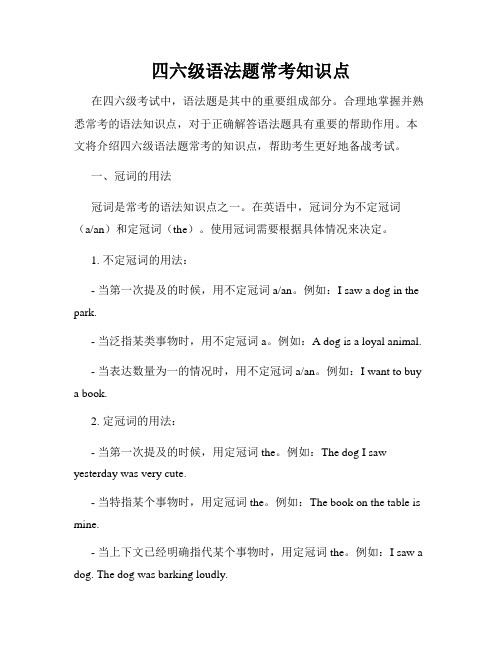
四六级语法题常考知识点在四六级考试中,语法题是其中的重要组成部分。
合理地掌握并熟悉常考的语法知识点,对于正确解答语法题具有重要的帮助作用。
本文将介绍四六级语法题常考的知识点,帮助考生更好地备战考试。
一、冠词的用法冠词是常考的语法知识点之一。
在英语中,冠词分为不定冠词(a/an)和定冠词(the)。
使用冠词需要根据具体情况来决定。
1. 不定冠词的用法:- 当第一次提及的时候,用不定冠词a/an。
例如:I saw a dog in the park.- 当泛指某类事物时,用不定冠词a。
例如:A dog is a loyal animal.- 当表达数量为一的情况时,用不定冠词a/an。
例如:I want to buya book.2. 定冠词的用法:- 当第一次提及的时候,用定冠词the。
例如:The dog I saw yesterday was very cute.- 当特指某个事物时,用定冠词the。
例如:The book on the table is mine.- 当上下文已经明确指代某个事物时,用定冠词the。
例如:I saw a dog. The dog was barking loudly.二、时态的运用时态是四六级语法题中经常涉及的内容。
正确的时态使用能够更准确地表达动作的发生时间和持续状态。
1. 一般现在时:- 表示经常性、习惯性的动作。
例如:I often go to the gym.- 表示客观真理。
例如:The sun rises in the east.- 表示现阶段的情况。
例如:I live in Beijing.2. 一般过去时:- 表达过去某个时间发生的动作。
例如:I watched a movie last night.- 表达过去的习惯性动作。
例如:He always played basketball when he was young.3. 一般将来时:- 表示将来要发生的动作。
四六级语法题考点经典总结
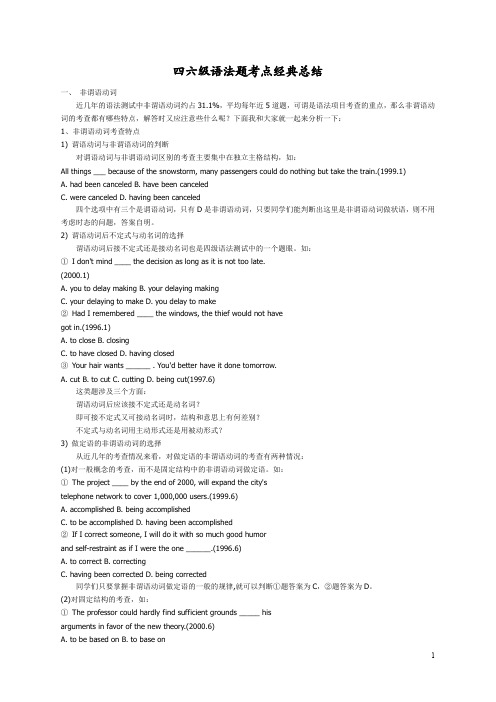
四六级语法题考点经典总结一、非谓语动词近几年的语法测试中非谓语动词约占31.1%,平均每年近5道题,可谓是语法项目考查的重点,那么非谓语动词的考查都有哪些特点,解答时又应注意些什么呢?下面我和大家就一起来分析一下:1、非谓语动词考查特点1) 谓语动词与非谓语动词的判断对谓语动词与非谓语动词区别的考查主要集中在独立主格结构,如:All things ___ because of the snowstorm, many passengers could do nothing but take the train.(1999.1)A. had been canceledB. have been canceledC. were canceledD. having been canceled四个选项中有三个是谓语动词,只有D是非谓语动词,只要同学们能判断出这里是非谓语动词做状语,则不用考虑时态的问题,答案自明。
2) 谓语动词后不定式与动名词的选择谓语动词后接不定式还是接动名词也是四级语法测试中的一个题眼。
如:①I don't mind ____ the decision as long as it is not too late.(2000.1)A. you to delay makingB. your delaying makingC. your delaying to makeD. you delay to make②Had I remembered ____ the windows, the thief would not havegot in.(1996.1)A. to closeB. closingC. to have closedD. having closed③Your hair wants ______ . You'd better have it done tomorrow.A. cutB. to cutC. cuttingD. being cut(1997.6)这类题涉及三个方面:谓语动词后应该接不定式还是动名词?即可接不定式又可接动名词时,结构和意思上有何差别?不定式与动名词用主动形式还是用被动形式?3) 做定语的非谓语动词的选择从近几年的考查情况来看,对做定语的非谓语动词的考查有两种情况:(1)对一般概念的考查,而不是固定结构中的非谓语动词做定语。
四六级中的常见语法知识点
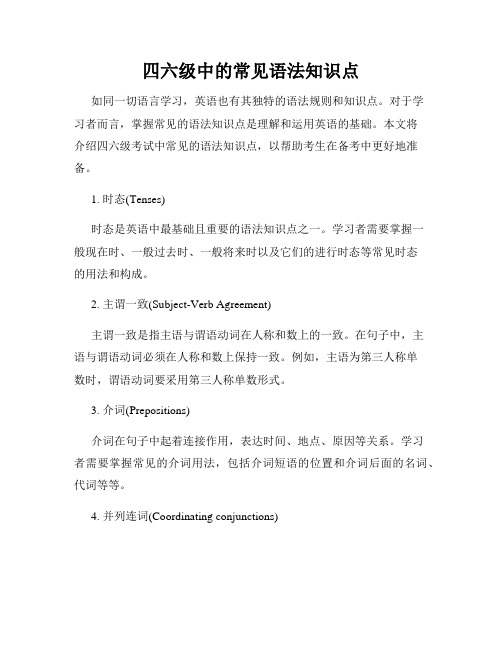
四六级中的常见语法知识点如同一切语言学习,英语也有其独特的语法规则和知识点。
对于学习者而言,掌握常见的语法知识点是理解和运用英语的基础。
本文将介绍四六级考试中常见的语法知识点,以帮助考生在备考中更好地准备。
1. 时态(Tenses)时态是英语中最基础且重要的语法知识点之一。
学习者需要掌握一般现在时、一般过去时、一般将来时以及它们的进行时态等常见时态的用法和构成。
2. 主谓一致(Subject-Verb Agreement)主谓一致是指主语与谓语动词在人称和数上的一致。
在句子中,主语与谓语动词必须在人称和数上保持一致。
例如,主语为第三人称单数时,谓语动词要采用第三人称单数形式。
3. 介词(Prepositions)介词在句子中起着连接作用,表达时间、地点、原因等关系。
学习者需要掌握常见的介词用法,包括介词短语的位置和介词后面的名词、代词等等。
4. 并列连词(Coordinating conjunctions)并列连词用于连接两个相同类型的词、短语或句子,常见的并列连词有and、but、or等。
学习者需要了解并列连词的用法及其在句子中起到的连接作用。
5. 从句(Clauses)从句是句子中的一个完整的句子结构,包含主语和谓语。
常见的从句包括名词性从句、定语从句和状语从句。
学习者需要了解不同种类的从句的用法和构造,以及它们在句子中的功能。
6. 计数与不可数名词(Countable and Uncountable nouns)计数名词表示可以被数出来的东西,如books、chairs等;而不可数名词表示无法被数出来的东西,如water、information等。
学习者需要了解这两种名词的用法和固定搭配。
7. 形容词与副词(Adjectives and Adverbs)形容词用来描述名词,副词则用来描述动词、形容词和其他副词。
学习者需要掌握形容词和副词的比较级和最高级形式、修饰位置以及常见的形容词和副词的用法。
英语四六级考试7大核心语法逐项解析

1、词类
冠词:关注冠词表示特指、泛指、类指的用法。
形容词和副词:形容词的排序也不容忽视。
动词词组:几乎每年必考,今年依旧需要关注。
2、动词的时态和语态:
阅读时时注意上下文的情景。
大纲要求的八种常用时态都有可能成为考查对象,再此基础上重点关注:进行时、完成时和完成进行时。
同时注意如Hardly…when…等经常考查的表示时间的固定句式。
3、非谓语动词
(1)牢记哪些动词后的宾语只能是不定式、动名词,哪些二者兼可。
(2)分词和不定式做宾补的区别。
(3)分词作状语。
4、情态动词与虚拟语气
依旧会受到命题人的青睐。
虚拟语气是难点但不是重点,重点注意其在非真实条件句和名词性从句的使用。
5、定语从句和名词性从句
定语从句:近五年必考。
注意点:关系代词和关系副词的区别,as和which的区别,限制性和非限制性定语从句的区别、定语从句和同位语从句的区别。
注意名词性从句引导词的选择和语序。
6、状语从句
重点关注in case, unless等连词引导的条件状语从句。
注意:while, when, until, not…until, before, since引导的时间状语从句。
同时关注:目的和结果状语从句。
7、特殊句式
特殊句式注意倒装句、强调句、反意疑问句、祈使句和省略句。
大学英语四六级语法真题长难句解析

四六级真题长难句分析
基本结构的长难句
1.断开:连接词断开,结束于下一个连接词前
Although it has been nearly 30 years since the first commercial mobile-phone network was launched, advertisers have yet to figure out how to get their messages out to mobile-phone users in a big way. CET-4, 201312 选词填空
四六级真题长难句分析
基本结构的长难句
1.断开:连接词断开,结束于第二个谓语动词前
Though the United States has fewer women in the workforce, American women who choose to be employed are far more likely to work fulltime and to hold high-level jobs as managers or professionals. CET-6, 201406长篇阅读
基本结构的长难句
1.断开:分析主谓
This is the best movie I have seen.
主谓
主谓
The present he gave me was very amazing.
四六级真题长难句分析
基本结构的长难句
1.断开:分析主谓
This is the best movie I have seen.
四六级真题长难句分析
基本结构的长难句
1.断开:连接词断开,结束于第二个谓语动词前
四级真题解析语法重点剖析

四级真题解析语法重点剖析在四级考试中,语法是一个非常重要的题型。
准确理解和掌握语法规则,对于学生顺利通过四级考试至关重要。
本文将对四级真题中的语法重点进行剖析,以帮助同学们更好地备考。
一、主谓一致主谓一致是四级考试中常出现的语法问题。
主谓一致是指谓语动词的数与其所修饰的主语保持一致。
例如:1. Each of the students (has/have) their own opinions.在这个例子中,主语"each of the students"是单数,所以谓语动词也应该用单数形式"has"。
2. The committee (has/have) reached a decision.在这个例子中,主语"the committee"是单数,所以谓语动词也应该用单数形式"has"。
二、时态与语态在四级考试中,时态和语态也是常考的语法问题。
时态是指动词表示的动作或状态发生的时间,而语态是指句子所表达的动作是及物动词的主动还是被动形式。
例如:1. By the time I arrived, all the tickets (had sold/had been sold) out.在这个例子中,"by the time I arrived"表示过去的时间点,所以谓语动词应该用过去完成时的形式"had sold out"。
2. The letter (type/typed) by my secretary last week.在这个例子中,动作的执行者是"my secretary",所以应该使用被动语态,谓语动词的形式应该是"was typed"。
三、固定搭配四级考试中,也常考察一些常用的固定搭配,例如:1. It's time (to go/go) to bed.在这个例子中,固定搭配是"it's time to",表示"是做某事的时候了",所以应该选择"to go"。
四六级中的语法错误解析

四六级中的语法错误解析语法是英语学习中不可忽视的一部分,掌握好语法规则可以帮助学习者更准确地表达自己的意思。
然而,在四六级考试中,许多考生容易犯一些常见的语法错误。
本文将对四六级中常见的语法错误进行解析,并给出相应的纠正方法。
一、主谓一致错误主谓一致错误是指句子中主语与谓语在人称和数上不一致的错误。
例如:1. The students is studying for the exam. (原句错误)The students are studying for the exam.(纠正后)2. My friend and I am going to the party.(原句错误)My friend and I are going to the party.(纠正后)解析:主谓一致是英语语法中的基本规则之一,谓语动词的单复数形式应与主语保持一致。
因此,需要注意句子中的主语的形式,合理选择谓语动词的单复数形式。
二、时态错误在英语中,时间的表达是非常重要的,时态错误容易造成句子的混乱和误解。
以下是一些常见的时态错误:1. I have been to Beijing last year.(原句错误)I went to Beijing last year.(纠正后)2. She will go shopping yesterday.(原句错误)She went shopping yesterday.(纠正后)解析:要正确使用时态,需要了解各种时态的用法和规则。
一般过去时用于过去发生的动作或状态,现在完成时表示过去某个时间点之前发生的动作或状态,将来时表示将来要发生的动作。
因此,根据句子所描述的情境,正确选择适当的时态。
三、冠词错误冠词错误是指句子中使用不当的冠词或者漏用冠词的错误。
例如:1. I am teacher.(原句错误)I am a teacher.(纠正后)2. Give me pencil, please.(原句错误)Give me a pencil, please.(纠正后)解析:冠词在英语中很重要,它可以限定名词的范围或者表示泛指。
英语四六级语法解析
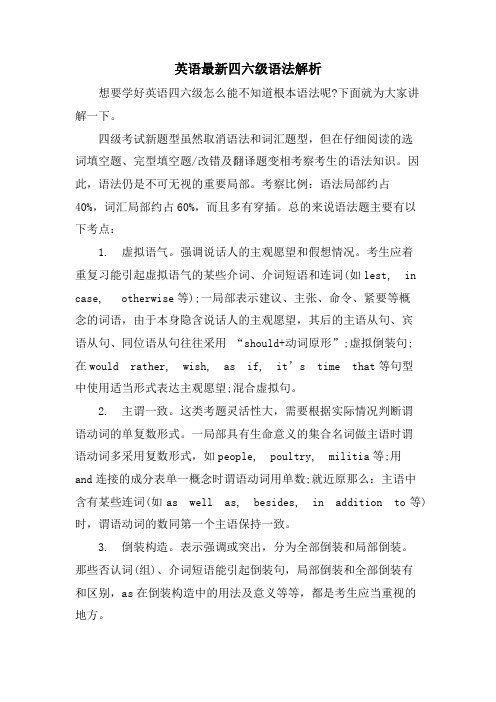
英语最新四六级语法解析想要学好英语四六级怎么能不知道根本语法呢?下面就为大家讲解一下。
四级考试新题型虽然取消语法和词汇题型,但在仔细阅读的选词填空题、完型填空题/改错及翻译题变相考察考生的语法知识。
因此,语法仍是不可无视的重要局部。
考察比例:语法局部约占40%,词汇局部约占60%,而且多有穿插。
总的来说语法题主要有以下考点:1. 虚拟语气。
强调说话人的主观愿望和假想情况。
考生应着重复习能引起虚拟语气的某些介词、介词短语和连词(如lest, in case, otherwise等);一局部表示建议、主张、命令、紧要等概念的词语,由于本身隐含说话人的主观愿望,其后的主语从句、宾语从句、同位语从句往往采用“should+动词原形”;虚拟倒装句;在would rather, wish, as if, it’s time that等句型中使用适当形式表达主观愿望;混合虚拟句。
2. 主谓一致。
这类考题灵活性大,需要根据实际情况判断谓语动词的单复数形式。
一局部具有生命意义的集合名词做主语时谓语动词多采用复数形式,如people, poultry, militia等;用and连接的成分表单一概念时谓语动词用单数;就近原那么:主语中含有某些连词(如as well as, besides, in addition to等)时,谓语动词的数同第一个主语保持一致。
3. 倒装构造。
表示强调或突出,分为全部倒装和局部倒装。
那些否认词(组)、介词短语能引起倒装句,局部倒装和全部倒装有和区别,as在倒装构造中的用法及意义等等,都是考生应当重视的地方。
4. 非谓语动词。
这是词汇与构造考试中语法局部的重中之重,解题时可以从三个方面入手:①根据非谓语动词同其所修饰的名词或逻辑主语的一致关系,确定使用主动语态或被动语态,然后考虑采用现在分词、现在分词被动式或过去分词;②非谓语动词同主句谓语动词动作发生的先后关系。
动作正在进展的用现在分词进展式,同时发生或不分先后发生的用现在现在分词一般式或过去分词;在主句谓语动词之前发生的用现在分词完成式、不定式完成式;发生在主句谓语动词之后的多用不定式一般式;③表状态多用分词,表目的多用不定式。
语法解析四级语法真题详解

语法解析四级语法真题详解本文对四级语法真题进行详细解析,分析其中的语法知识点和解题技巧。
通过阅读本文,读者可以加深对四级语法知识的理解,提高语法解析题的应对能力。
一、动词的时态和语态动词的时态和语态是四级语法中的重要考点。
下面通过具体的题目进行解析。
1. 根据下列句子选择正确答案。
He____a letter to the manager and immediately____it into the mailbox.A. wrote; droppedB. writes; dropsC. will write; dropsD. would write; dropped答案:A解析:这是一个完成的动作,发生在过去某个时间,所以用一般过去时态。
句中第二个动作立即发生,所以用一般过去时态。
二、代词的用法代词的使用也是四级语法考试的重要内容。
以下是一个相关的题目。
2. According to statistics,____of the graduates are willing to work in small towns.A. a majorityB. the majorityC. the majoritiesD. majorities答案:B解析:根据句意,绝大多数的毕业生愿意去小镇上工作,所以这里应该使用the majority 表示特指的意思。
三、冠词和名词的用法冠词和名词的用法也是四级语法考试的重要内容。
以下是一个相关的题目。
3. It's ____widening income gap between the rich and the poor that worries people most at present.A. the; aB. a; aC. the; theD. the; /答案:C解析:根据句意,这里特指的是"当前最担心的事情",所以用定冠词the;而income gap 是特指的名词,也应该使用定冠词the。
- 1、下载文档前请自行甄别文档内容的完整性,平台不提供额外的编辑、内容补充、找答案等附加服务。
- 2、"仅部分预览"的文档,不可在线预览部分如存在完整性等问题,可反馈申请退款(可完整预览的文档不适用该条件!)。
- 3、如文档侵犯您的权益,请联系客服反馈,我们会尽快为您处理(人工客服工作时间:9:00-18:30)。
四六级真题语法解析常见题型:听力理解、选词填空、信息匹配、阅读多项选择、段落翻译、短文写作常见句型:1. It is true/ obvious/clear/ possible/ certain that…真题解析:①It is simply not true that economic growth will surely make our world cleaner.(16 年6 月CET6,第一套)经济增长一定会使环境改善也绝非事实。
②It is certainly possible that we could get very slow growth over the next year.(16 年6 月CET6,第一套)在下一年里取得缓慢的增长是完全可能的。
③It is clear that consumers don’t always know what they are getting.(16 年6 月CET6,第三套)很明显,对于自己买的产品究竟是何等货色,消费者们并不总是很清楚。
2. It is hard/difficult/important/necessary/possible ( for sb.) to do sth.真题解析:①Therefore,it is advisable for us to distinguish the authenticity of information. (16 年6 月CET6,第一套)因此,对我们来说,学会甄别信息是可取的。
②It is highly important to expand the metropolitan areas. (15 年12 月CET6,第一套)扩大都市圈至关重要。
3. It is reported/learned/estimated that ...真题解析:①It is estimated that step would save hundreds of billions of dollars over the next decade. (16 年6 月CET6,第二套)据估计,这一举措将在未来十年节省数千亿美元。
4. It looks as if/as though…真题解析:①It looks as though self-control is something that in one generation can disadvantage the next generation. (16 年6 月CET6,第二套)这样看来,上一代的自制力似乎会影响到下一代。
5. It is + 被强调部分+ that ...真题解析:①It was this lack of information that prompted the launch of I’m First in 2013. (15 年12 月CET6,第一套)正是由于信息缺乏,促使“我是第一代”机构于2013 年成立。
②It was only in the 20th century that Leonardo’s portrait of his patron’s wife rocketed to the number-one spot.(15 年6 月CET6,第一套)直到20 世纪,莱昂纳多为其赞助人的妻子画的画像才飙升至首要位置。
③It’s when you find yourself surrounded by toxic friends who live in the past that you realize you’re not getting any younger. (15 年6 月CET6,第一套)当你发现你的朋友都沉迷在过去的时候,你会意识到自己不再年轻。
④It was his curiosity that made him invent so many things and achieved great success in his career. (15 年6 月CET6,第二套)正是他的好奇心驱使他发明了如此多的东西,从而最终在事业上取得了巨大的成功。
⑤It is due to his focus on small things that Apple makes great success in the mobile field. (15 年6 月CET6,第三套)正是由于他专注于做小事情,苹果公司才在手机行业取得了巨大的成功。
6. It takes(sb.)... to do sth.真题解析:①It will take a long time to change the current trend in higher education. (15年12 月CET6,第二套)改变高等教育的现状需要很长时间。
7.It is not until + 被强调部分+ that ...真题解析:①It wasn’t until I hit around 25 that I realized I’d missed a large chunk of my life for absolutely no reason. (15 年6 月CET6,第二套)直到我25 岁我才意识到我毫无缘由地错过了生活中的大把时光。
(二)名词性从句常见题型:听力理解、选词填空、信息匹配、阅读多项选择、短文写作、段落翻译常见句型:1.主语从句真题解析:①But what most students and parents don’t realize is that schools have hidden motives for offering early decision. (15 年5 月CET6,第二套)但是,大多数学生和家长并没有意识到,学校之所以提前录取是有其隐藏动机的。
2.宾语从句真题解析:①Piaget argued that attaining and accepting a vocation is one of the best ways to modify idealized views and to mature.(16 年6 月CET6,第一套)皮亚杰认为获得并接受一份职业是修正理想化观念和使人变成熟的最好途径之一。
②…all the facts suggest that high unemployment in America is the result of inadequate demand.(16 年6 月CET6,第一套)所有的事实都表明美国的高失业率是需求不足的结果。
③The study found that even in high-poverty schools,teachers consistently had a huge positive or negative impact. (16 年6 月CET6,第三套)研究发现,即便在极度贫困的学校,教师也始终起到了巨大的积极或消极的影响。
④On the contrary, other people claim that it is a common phenomenon that a host of youngsters spend so much time reading on social networks. (15 年12 月CET6,第一套)而相反,另一些人却认为现在的年轻人花费太多的时间浏览社交网络。
⑤From the standpoint of a traditional educator, this outcome indicated that schooling had failed to help students think about major scientific ideas. (15 年12 月CET6,第三套)从传统教育工作者的角度来看,这一结果表明,学校教育未能帮助学生思考重要科学理念。
⑥He points out that the most reproduced works of impressionism today tend to have been bought by five or six wealthy and influential collectors in the late 19th century. (15 年6 月CET6,第一套)他指出,当今转载最多的印象派作品大多在19 世纪末被五六个富裕并有影响力的收藏家购买过。
3.表语从句真题解析:①And that, fundamentally, is why claims that we face huge structural problems have been multiplying. (16 年6 月CET6,第一套)这也就从根本上解释了为什么我们面临巨大的结构性问题的论调被多次复制。
②Chances are that the product is made in China.(15 年12 月CET6,第二套)很有可能这件产品是中国制造的。
③…this sort of activity is where the future of environmental action lies. (15年12 月CET6,第三套)这种活动正是环境行动的未来所在。
④The lesson taught by plants is that sharing life expands and enhances the sphere of the living. (15 年6 月CET6,第一套)植物教给我们的是分享生活,拓展生命空间,提升生命层次。
⑤The problem is that this process effectively shortens the window of time students have to make one of the most important decisions of their lives up to that point. (15 年6 月CET6,第二套)问题在于这个过程有效地将学生必须做出人生重大决策之一的一小段时间缩短到那一刻。
4.同位语从句真题解析:① But missing from all these data is the sense that today’s young care very much about their country, about political environment, or about the future of their society. (16 年6 月CET6,第三套)但在这所有这些数据中,都没有信息表明当今年轻人关心自己的国家,关心政治环境,或者关心社会的未来。
